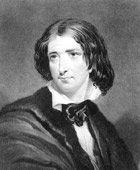Great Throughts Treasury
This site is dedicated to the memory of Dr. Alan William Smolowe who gave birth to the creation of this database.

James Henry Leigh Hunt
English Author, Essayist and Poet
"It is our daily duty to consider that in all circumstances of life, pleasurable, painful, or otherwise, the conduct of every human being affects, more or less, the happiness of others, especially of those in the same house; and that, as life is made up, for the most part, not of great occasions, but of small everyday moments, it is the giving to those moments their greatest amount of peace, pleasantness, and security, that contributes most to the sum of human good. Be peaceable. Be cheerful. Be true."
"Truth is forever truth."
"Affection, like melancholy, magnifies trifles; but the magnifying of the one is like looking through a telescope at heavenly objects; that of the other, like enlarging monsters with a microscope."
"Patience and gentleness are power."
"Beauty too often sacrifices to fashion. The spirit of fashion is not the beautiful, but the willful; not the graceful, but the fantastic; not the superior in the abstract, but the superior in the worst of all concretes - the vulgar. The high point of taste and elegance is to be sought for, not in the most fashionable circles, but in the best-bred, and such as can dispense with the eternal necessity of never being twice the same."
"Danger for danger’s sake is senseless."
"Did you ever observe that immoderate laughter always ends in a sigh?"
"For the most part, we should pray rather in aspiration than petition, rather by hoping than requesting; in which spirit also we may breathe a devout wish for a blessing on others upon occasions when it might be presumptuous to beg it."
"God made both tears and laughter, and both for kind purposes; for as laughter enables mirth and surprise to breathe freely, so tears enable sorrow to vent itself patiently. Tears hinder sorrow from becoming despair and madness; and laughter is on top of the very privileges of reason, being confined to the human species."
"I am persuaded there is no such thing after all as a perfect enjoyment of solitude; for the more delicious the solitude the more one wants a companion."
"Improvement is nature."
"Leaves seem light and useless, and idle and wavering, and changeable - they even dance; yet God has made them part of the oak. In so doing, He has give us a lesson, not to deny the stout-heartedness within because we see the lightsomeness without."
"Mirth itself is too often but melancholy in disguise."
"No wonder is greater than any other wonder, and if once explained ceases to be a wonder."
"Occupation is the necessary basis of all enjoyment."
"Part of our good consists in the endeavor to do sorrows away, and in the power to sustain them when the endeavor fails, to bear them nobly, and thus help others to bear them as well."
"Poetry is the breath of beauty."
"Some tears belong to us because we are unfortunate; others, because we are humane; many because we are mortal. But most are caused by our being unwise. It is these last only that of necessity produce more."
"The mind may undoubtedly affect the body; but the body also affects the mind. There is a reaction between them; and by lessening it on either side, you diminish the pain on both."
"When Goethe says that in every human condition foes lie in wait for us, “invincible only by cheerfulness and equanimity,” he does not mean that we can at all times be really cheerful, or at a moment’s notice; but that the endeavor to look at the better side of things will produce the habit, and that this habit is the surest safeguard against the danger of sudden evils."
"It is books that teach us to refine our pleasures when young, and to recall them with satisfaction when we are old."
"The man who can be nothing but serious, or nothing but merry, is but half a man."
"God made both tears and laughter, and both for kind purposes; for as laughter enables mirth and surprise to breathe freely, so tears enable sorrow to vent itself patiently. Tears hinder sorrow from becoming despair and madness."
"Tears hinder sorrow from becoming despair."